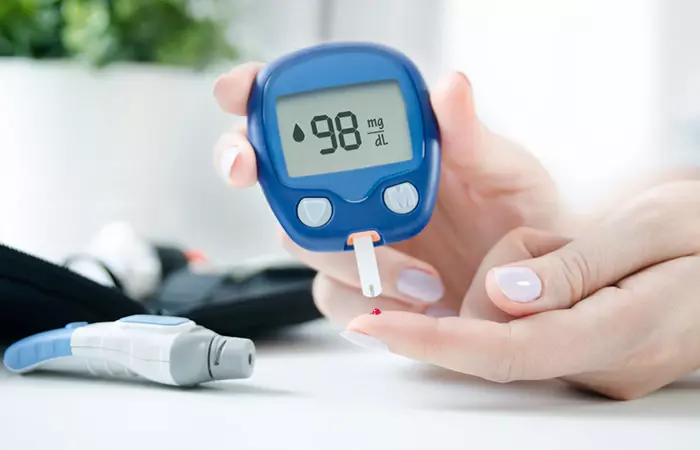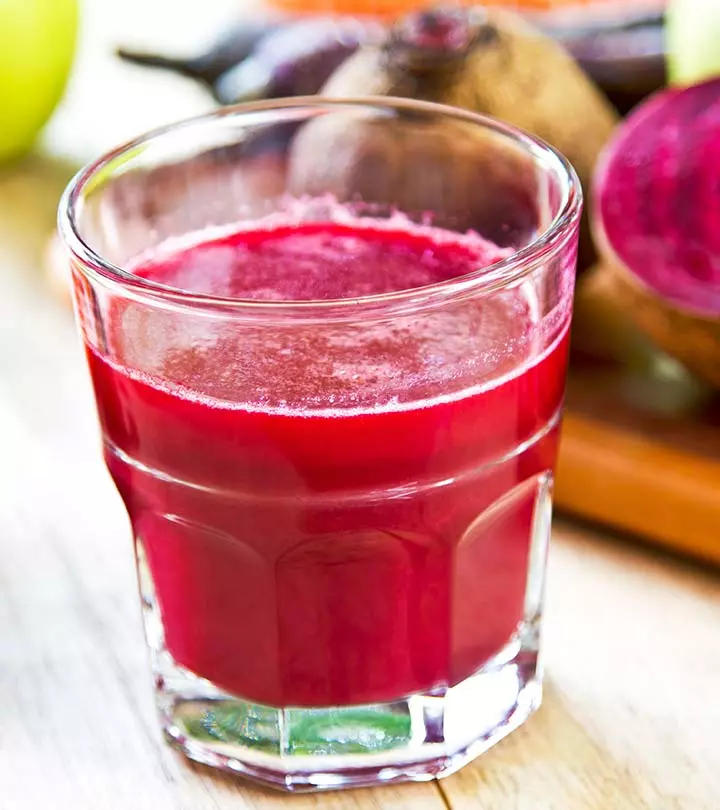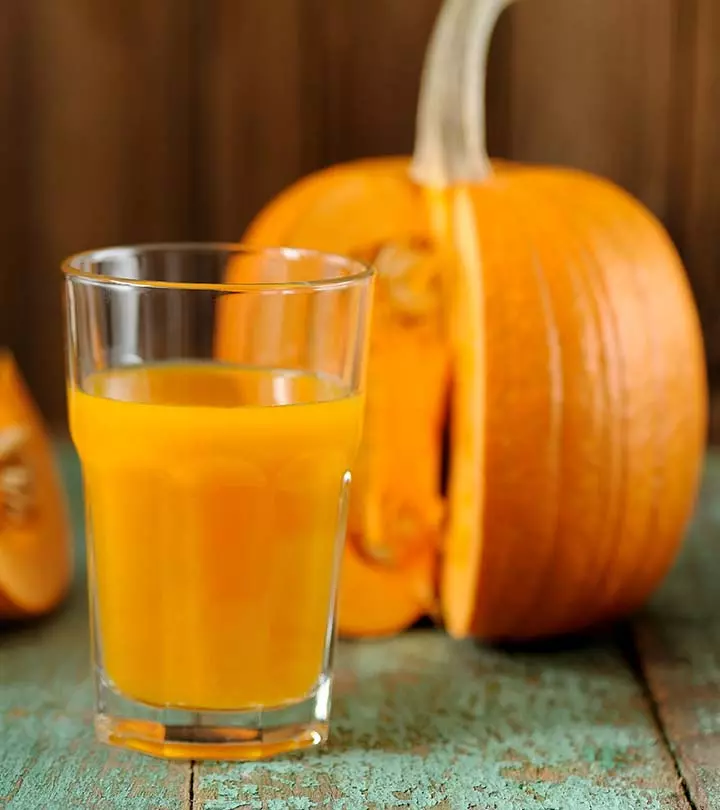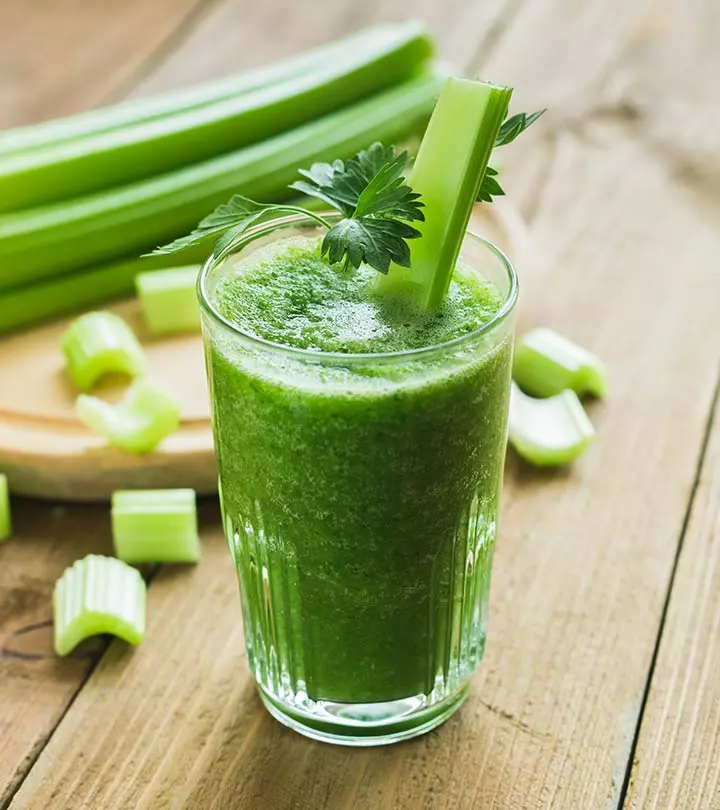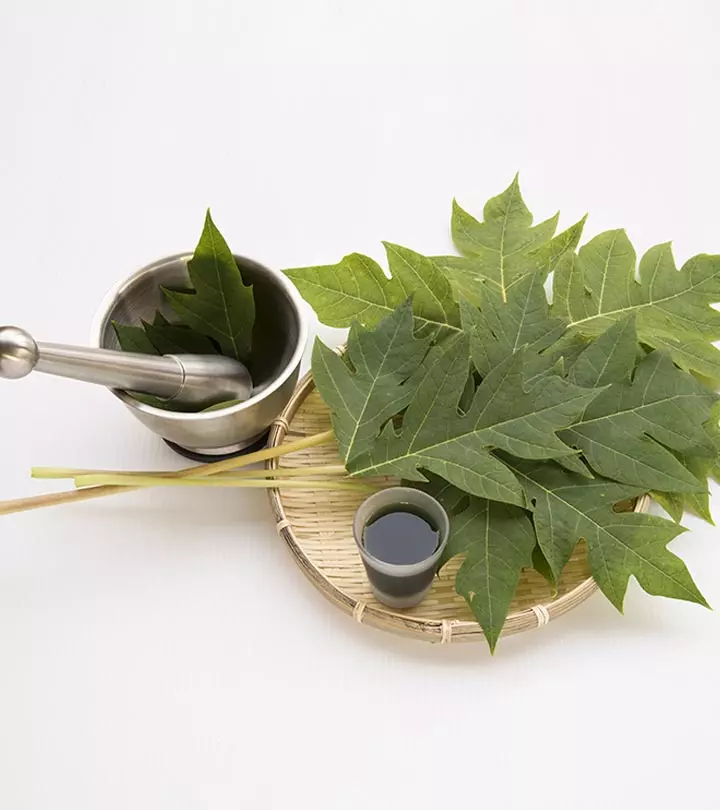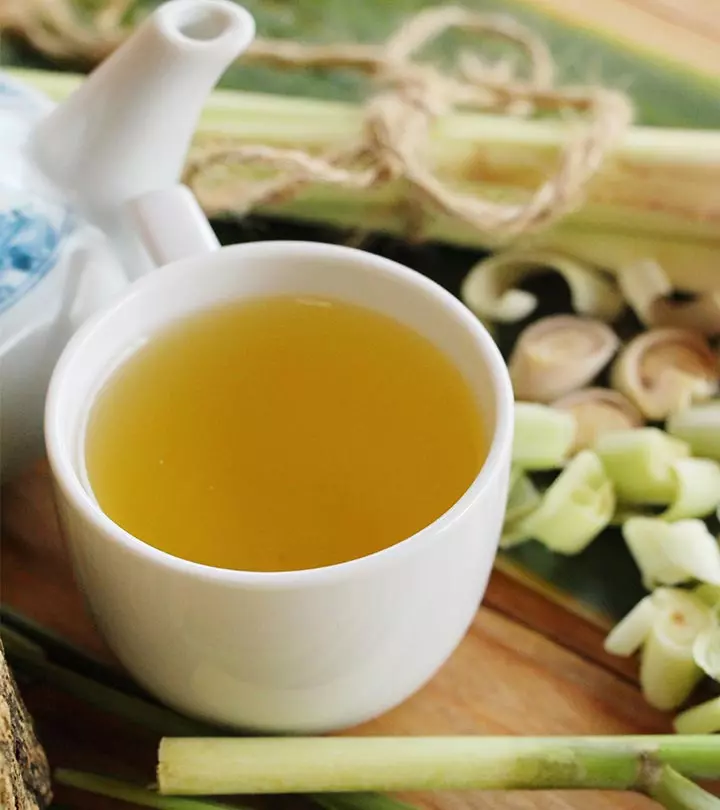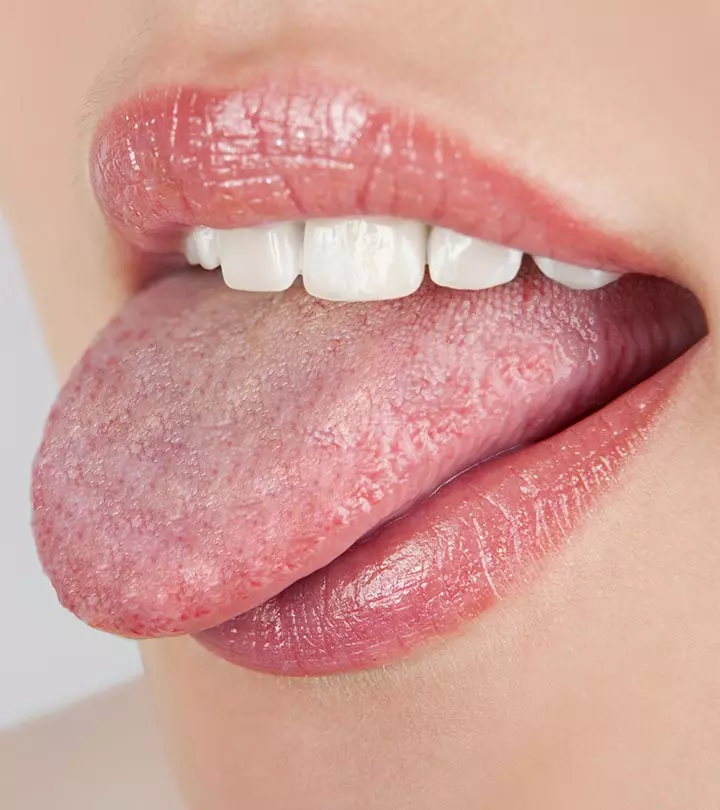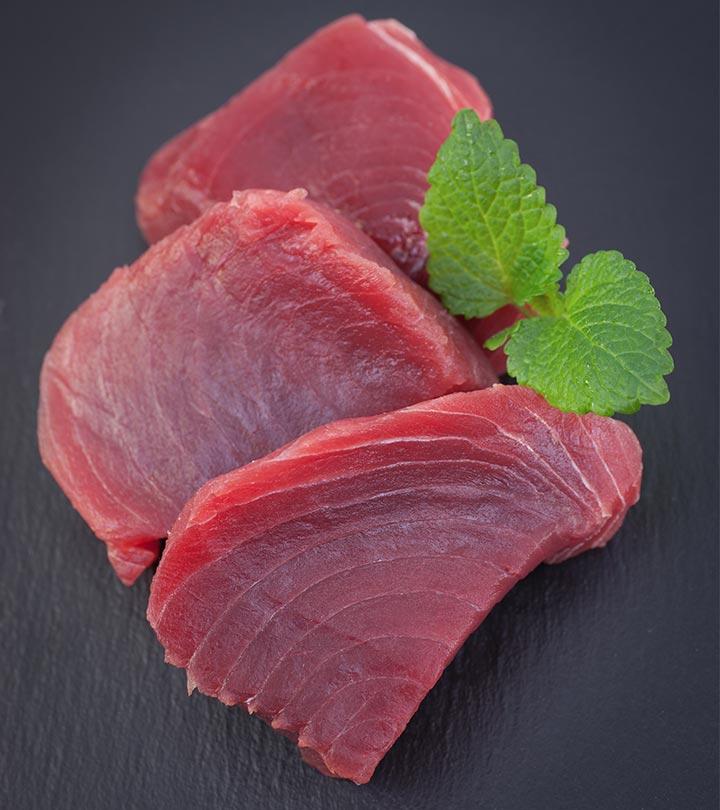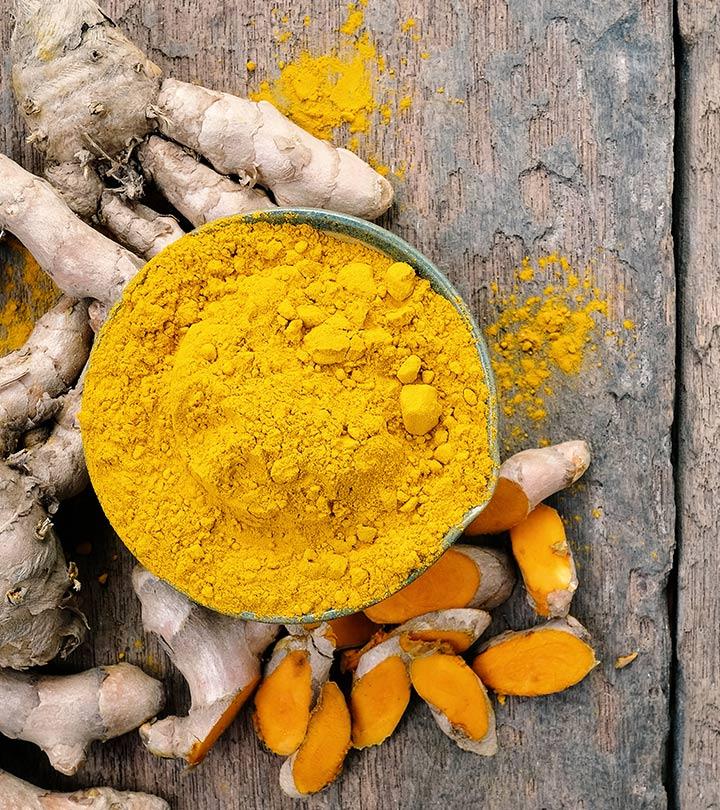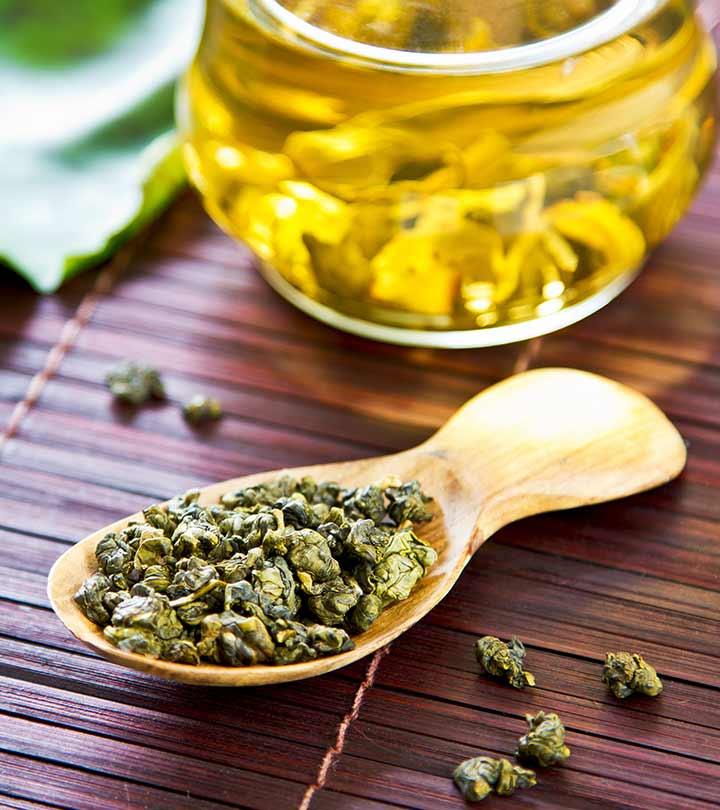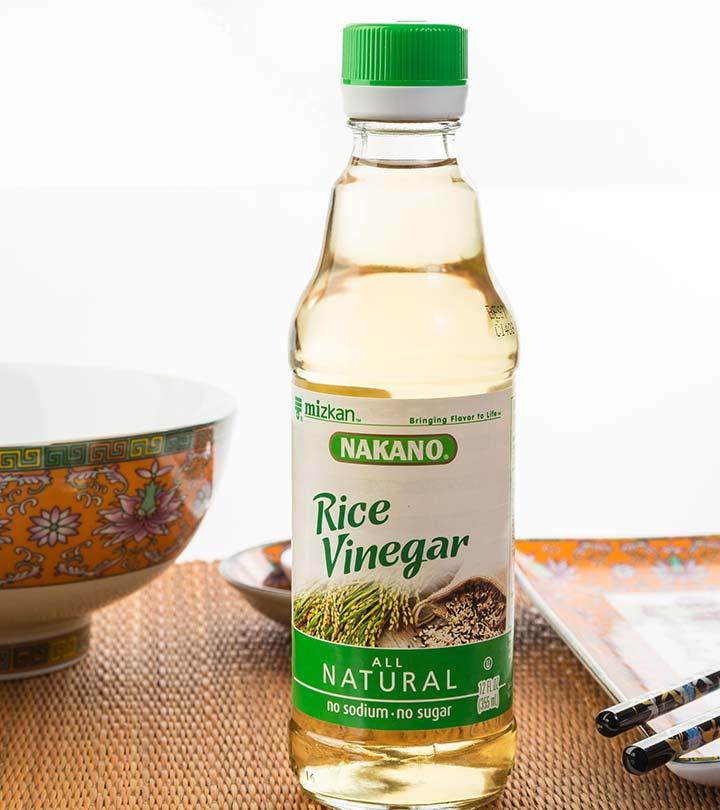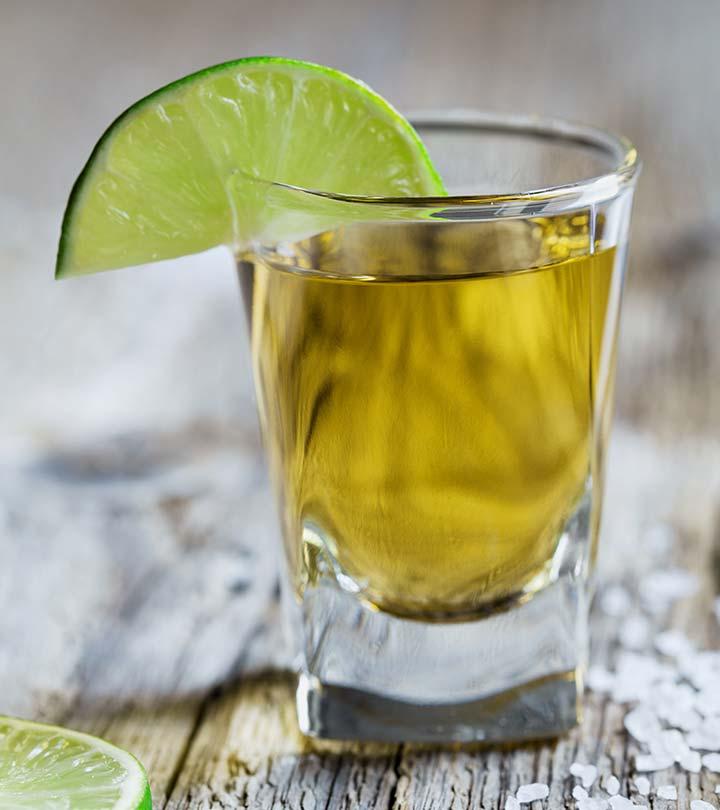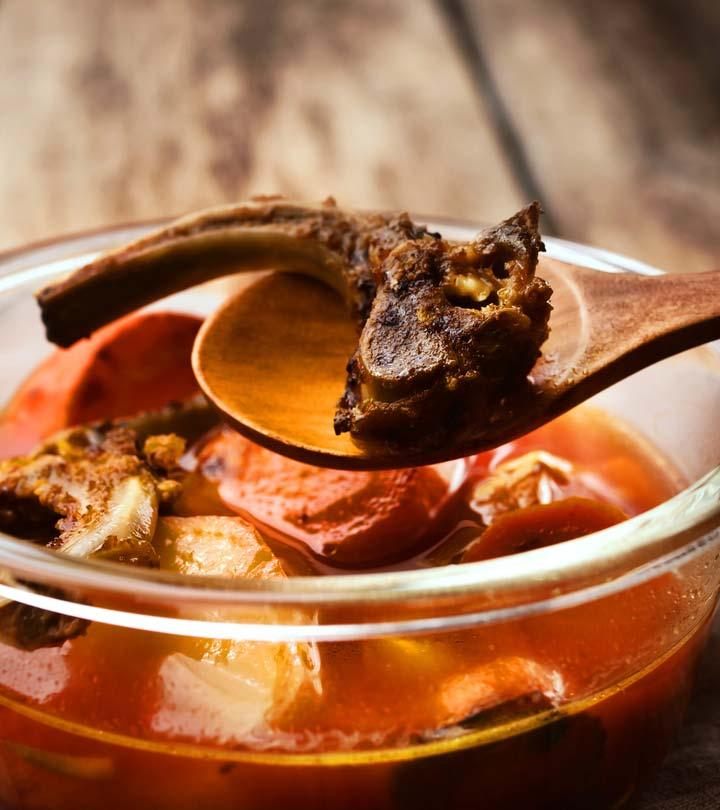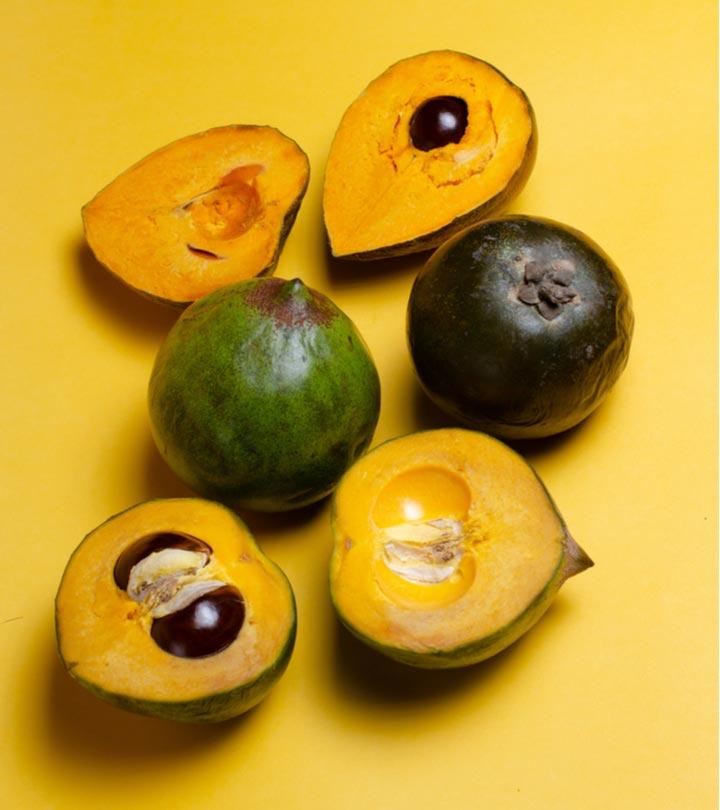15 Health Benefits Of Drinking Aloe Vera Juice
This succulent plant drink has become a favorite among health enthusiasts for the right reasons.
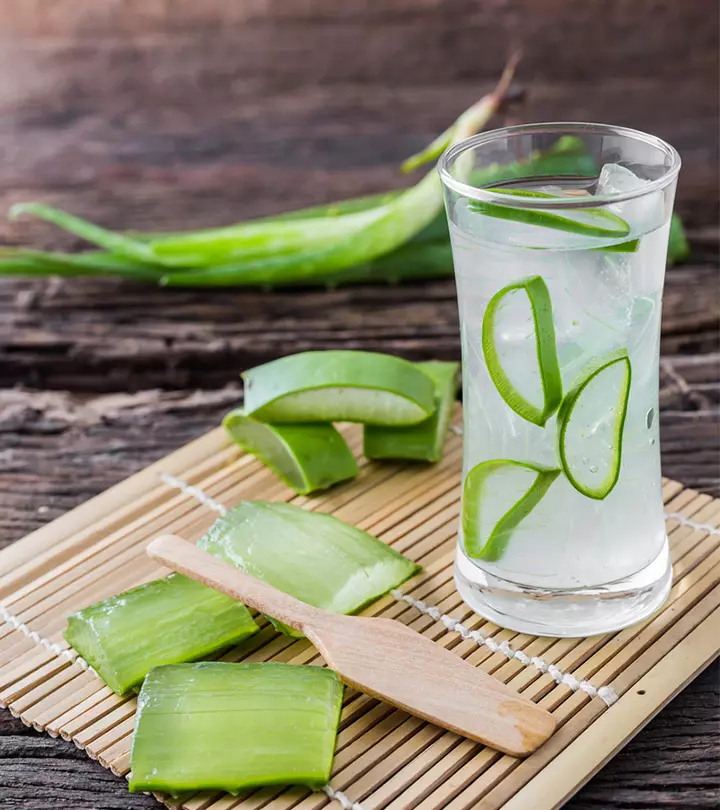
Image: Shutterstock
Aloe vera juice benefits are gaining the attention of many health enthusiasts and are being researched. This succulent plant grows in tropical climates worldwide. Its use dates back to centuries. Now its juice is trending, and many consume it regularly for its benefits.
Aloe vera juice has approximately 75 beneficial active constituents, including amino acids, lignin, enzymes, minerals, vitamins, sugar, salicylic acid, and saponins (1). Applying this juice to the skin may heal sunburns, acne, and enhance overall skin health. In addition, consuming it offers an array of other health benefits.
So, wondering what exactly is aloe vera juice good for, and how consuming aloe vera juice can benefit you? Read on! Also, learn about the right dosage and possible side effects associated with its consumption.
 Know Your Ingredient: Aloe Vera Juice
Know Your Ingredient: Aloe Vera JuiceWhat Is It?
A thick, gloopy liquid extracted from the flesh of aloe vera plants.
What Are Its Benefits?
It regulates blood sugar levels and improves skin, oral, heart, and digestive health.
Who Can Consume It?
All except people with kidney or liver problems and pregnant or lactating women.
How Often?
You can drink 300 g of aloe vera juice daily.
Caution
Some individuals may experience abdominal cramps or diarrhea.
In This Article
Health Benefits Of Aloe Vera Juice
1. May Treat Digestive Issues
The juice has laxative properties. It encourages gut bacteria and can help ease gastrointestinal disorders (2). It also has been found to soothe chronic ulcers (3).
Aloe vera juice may cleanse the digestive tract. This may help in the treatment of irritable bowel syndrome (4). Though other forms of aloe vera may also help in this regard, the juice is believed to get better absorbed in the stomach. The juice also stimulates the production of bile, and this promotes liver health (5). Dr. Jesse P. Houghton, MD, FACG, says, “It acts as a natural laxative via 2 mechanisms: providing hydration with its high water content. It also contains something called anthraquinones, which act as a stimulant laxative.”
According to an Iranian study, aloe vera juice can reduce abdominal pain and flatulence in patients with irritable bowel syndrome. However, more research is required in relation to stool consistency in these patients (6). The latex of the aloe vera plant may help treat constipation. However, more research is needed.
As per an Indian study, aloe vera juice can be extensively used in the treatment of peptic ulcers. It exhibits antibacterial properties against H. pylori, the bacteria responsible for gastric infections (7).
Another Indian study states that the use of aloe vera for digestive ailments may have no adverse effects (8).
However, it is important to note that a major portion of this research is based on personal experiences. Hence, more studies are needed to understand the effectiveness of aloe vera juice in treating digestive issues.
The juice can have an anti-inflammatory effect on people with ulcerative colitisi An inflammatory bowel condition that affects the large intestine and causes painful ulcers in the colon. (9). As there have been cases of diarrhea as well, practice caution.
You may also use aloe vera to cleanse your colon by injecting it into the colon with water. However, this process is to be carried only under medical supervision. There is very less research on its effectiveness.
 Fun Fact
Fun Fact2. May Reduce Inflammation
The anti-inflammatory properties of aloe vera juice may help in the treatment of inflammatory bowel disease (10). As per a Mexican rat study, the anti-inflammatory agents in the juice can also treat edema (11).
Decolorized aloe was also found to reduce skin inflammation, especially when used by podiatric (specialists in foot care) physicians (12).
A German study had also revealed the anti-inflammatory properties of aloe vera juice on skin. The gel (and potentially the juice too) had reduced UV-induced erythemai Redness of the skin caused by damaged blood capillaries that occur from wounding, allergic reactions or other injuries. (13).
Gibberellin, a hormone in aloe vera juice, was found to fight inflammation in diabetic animals (14).
Aloe vera may also be used in the treatment of pain associated with osteoarthritis (15). However, long-term studies are required to prescribe aloe vera juice as a treatment for osteoarthritis.
Due to its anti-inflammatory properties, the juice can provide relief from joint immobility. The aloe vera juice (and the gel) also may act as an effective base to prepare a compound called nimesulide emulgel. It possesses significant anti-inflammatory properties and could be used to treat rheumatoid arthritis (16). Aloe vera juice may also help with menopause symptoms. “Aloe vera juice may help hot flashes by reducing inflammation,” says Registered Dietitian and Founder of Eat Drink Binge, Ronald Smith, “Aloe vera juice is a natural remedy for menopause symptoms and alleviates many of the symptoms associated with menopause. It can help ease vaginal dryness, mood swings, and insomnia.”
3. May Promote Heart Health
Aloe vera gel was found to reduce the development of fatty streaks in rabbits. The gel (and the juice) may reduce the development of atherosclerosisi A condition that causes the deposition of fats, calcium, cholesterol and other wastes in the arteries, leading to obstruction of blood flow. in humans (17).
An Indian study conducted on rats showed that aloe vera juice could mitigate heart problems that usually were a side effect of the drug doxorubicin (used for cancer treatment) (18).
Another study showed the cardioprotective activity of aloe vera in diabetic rats (19). Supplementation of aloe vera juice, along with appropriate nutritional counseling, could lower blood pressure levels in people with diabetes (20).
Aloe vera juice has also been shown to lower cholesterol levels in the livers of rats. The group supplemented with aloe had shown a 30% reduction in hepatic cholesterol levels (21).
Aloe vera juice may also dilate capillaries and enhance the arterial walls. However, research is limited in this regard.
4. May Detoxify The Body
An Italian study focused on the efficacy of aloe vera in detoxification. The leaf extracts were found to flush out wastes from the body (22). The juice of the plant may also be effective in this process (23).
Aloe vera juice also exhibits hepatoprotectivei ‘Hepato’ refers to the liver; thus, foods or drugs that heal, protect and enhance liver functions are known as hepatoprotective. activity. This may further improve detoxification, as the liver is one important organ involved in the process (24).
The laxative properties of aloe vera juice may clear the ingested toxins away from the digestive system (25).
Another rat study states that the juice can have a protective effect on the liver during diabetes (26).
5. May Aid Weight Loss
Inflammation is linked to weight gain and metabolic issues (27). Aloe vera juice may play a beneficial role due to its anti-inflammatory properties.
Te laxative properties of aloe vera juice may help with weight loss. However, there is no evidence supporting this.
Aloe vera juice contains potent sterols (called aloe sterols) that can regulate the metabolism of lipids (28). Obese rats fed with these sterols were found to have lower levels of body fat (29).
In a rat study, ingestion of aloe vera was found to prevent diet-induced obesity. It achieved this by stimulating energy expenditure and reducing accumulation of body fat (30).
Aloe vera juice had beneficial effects on obese individuals with prediabetes and diabetes. It reduced body weight, body fat mass, and insulin resistance in these individuals (31).
Aloe vera is one of the oldest medicinal plants that has applications in the food, cosmetic, and medicine industries. A 2019 study in SAGE Open Medicine indicates that the systematic consumption of this plant may also help in weight management. Check out the graph below to find out the major components of aloe vera.
Major Components Of Aloe Vera
Source: Aloe vera at the frontier of glycobiology and integrative medicine: Health implications of an ancient plant6. May Support The Immune System
A mice study states that ingestion of aloe vera juice could stimulate cellular and humoral (related to bodily fluids) immunity (32).
Aloe vera juice may act as an immune system enhancer. However, we need more research in this regard.
7. May Control Blood Sugar Levels
Preliminary research suggests that aloe vera juice intake may help improve blood glucose levels. However, the safety of aloe vera juice in this regard is yet to be established (33).
Certain nutrients in the juice are thought to improve the effectiveness of insulin. These may include chromium, magnesium, zinc, and manganese. However, further research is required to establish the link.
An American study discusses UP780, an aloe based composition, which may work as a natural supplement to maintain healthy blood glucose levels (34). Similar effects could be possible with aloe vera juice.
8. May Help Reduce Cancer Risk
As per a UAE study, aloe vera can inhibit cancer cell growth. It also can increase the effectiveness of cancer drugs, like cisplatin (35).
Aloe juice contains bioactive compounds, like aloin and lectin, that have anti-inflammatory properties (36). These may also help reduce cancer risk.
Aloe vera contains acemannan, a phytonutrienti A group of nutrients that have a plant origin, such as flavonoids, isoflavones, tannins and others. These are also known as phytochemicals. . Studies state that this phytonutrient may shrink cancer tumors (37).
Aloe vera juice was also found to reduce the spread of cancer (38). However, more research is needed to establish the anticancer properties of the juice.
9. May Hydrate The Body
Aloe vera juice contains nearly 75 active components that can replenish the body (5). It is believed to hydrate the body and relieve exhaustion, though research is limited in this regard.
As per a Brazilian study, aloe vera can also improve skin hydration (39).
10. May Improve Oral Health
An Indian study states that aloe vera juice could have unlimited use in the field of dentistry. Its antiseptic, antioxidant, and anti-inflammatory properties can help treat gingivitisi A non-severe bacterial infection of the gingiva or the gums that is mainly characterized by inflammation, soreness and bleeding. , plaque, and periodontitisi A bacterial disease that affects the gums and leads to inflammation, pain, bleeding and eventually loss of teeth. . Its antiviral properties can help heal oral infections as well (40).
Aloe vera juice may also act as an efficient mouthwash without any side effects (41).
The anti-inflammatory properties of aloe vera juice can also play a role in treating plaque-induced gingivitis (42).
11. May Promote Hair Health
The anti-inflammatory properties of aloe vera juice may soothe and moisturize the scalp. The juice may also treat an itchy scalp. However, research is limited in this area.
Sage Green, a health and fitness blogger, shared her experience of consuming aloe and was amazed with how it improved her hair health. She said, “I also noticed a significant improvement in my hair and scalp health. My hair was less tangled and felt softer and thicker. There was less breakage, and it was easier to comb (i).”
The antibacterial properties of aloe vera may help treat dandruff (43).
Anecdotal evidence suggests that the juice may also keep the dead skin cells from clogging the hair follicles. The alkaline nature of aloe vera juice may balance the pH levels of the hair and act as a good conditioning agent.
Aloe vera juice may add shine to your hair and control frizz. The vitamins and minerals in the juice may strengthen your hair. However, studies are limited in this area, and more research is required to know about these benefits.
12. May Provide The Essential Amino Acids
Aloe vera juice offers 16 of the 22 amino acids, including 7 of the 8 essential amino acids (44). These amino acids promote overall health and may also aid muscle growth.
13. May Improve Brain Health
Individuals given diets including aloe vera performed better on tasks of memory recall and recognition in a study. These participants also reported reduced incidences of tension or low mood (45). These effects could be attributed to the saccharidesi A type of carbohydrate present in foods. For example, acemannan, a common polysaccharide found in aloe vera. in aloe vera juice.
14. May Treat Heartburn
In a case of gastroesophageal reflux, aloe vera juice could reduce the symptoms. It also was well tolerated (46). The juice may also soothe the symptoms of heartburn.
According to another study, aloe vera syrup was found to be a safe treatment for GERD (gastroesophageal reflux disease) (47).
15. May Promote Women’s Health
Aloe vera juice offers an array of benefits to women. Anecdotal evidence suggests that its anti-inflammatory properties provide relief from menstrual cramps, easing discomfort during menstruation. Pregnant women may also benefit from aloe vera’s soothing qualities that help tackle itching and stretch marks naturally and safely. You can mix aloe juice with a carrier oil and apply it to your stretch marks.
Fresh aloe vera juice may reduce warts, psoriasis, eczema, rashes, vaginal infections, foot sores, and fungal infections (48). Aloe vera juice contains an enzyme that may help reduce hair loss and dandruff. Apart from drinking aloe vera juice, you can also apply it topically with coconut milk and wheat germ oil twice a week for best results. However, these benefits are stated anecdotally and detailed scientific research is warranted.
 Fun Fact
Fun FactAloe vera juice is a convenient way of ensuring optimal health for yourself and your family. However, not everybody can consume it as it may cause certain adverse effects.
Side Effects Of Aloe Vera Juice
- Potassium Deficiency
Aloe vera juice is a laxative and acts as a diuretic. Though this may lead to short-term weight loss, it can lead to potassium deficiency in the long run (1).
- Issues During Pregnancy And Breastfeeding
Aloe vera can be potentially dangerous when orally taken by pregnant or breastfeeding women. One report links aloe vera to miscarriage (49). Avoid use if you are pregnant or breastfeeding.
- Allergic Reactions
The intake of aloe juice may cause allergies in some individuals. The symptoms may include diarrhea, abdominal cramps, and red urine. Some may also experience aggravated constipation (1).
- Kidney Issues
The juice may result in kidney injury if it contains latex. However, research is lacking in this aspect. Those with a history of kidney issues must avoid aloe vera juice.
- Digestive Problems
The laxative effects of aloe vera juice may hamper optimal digestion and also lead to constipation in certain individuals. It may also cause abdominal cramps (muscle weakness) and electrolyte imbalances (1). Another digestive problem aloe vera juice can cause is diarrhea (50).
- Irregular Heartbeat
The possible electrolyte imbalances with aloe vera juice intake can also lead to irregular heartbeat, or arrhythmia (51).
- Liver Toxicity
Excess aloe juice intake can also lead to liver damage and toxicity (52). Hence, individuals with liver issues must be careful.
Drug Interactions
Aloe vera juice can decrease blood sugar, and this could cause a problem with diabetes medications (1).
Aloe vera juice can also interact with sevoflurane (used as anesthesia during surgery) (53). The juice exerts anti-platelet effects and may interfere with drugs like warfarin (used as a blood thinner) (54).
Dosage
Juice from 300 mg of aloe vera may be beneficial for lowering blood sugar levels (55). For further information on the ideal dosage, consult your doctor.
Precautions
Aloe vera juice could be unsafe for pregnant or breastfeeding women. The juice must also be avoided in children below 12 years of age.
Where To Buy Aloe Vera Juice
You can either pick a bottle of aloe vera juice from the nearest supermarket or place an order online. Following are the brands you may look for.
Infographic: 5 Health Benefits Of Aloe Vera Juice
Aloe Vera is a one-stop remedy for a lot of problems. People usually associate it with skincare and haircare, but drinking aloe juice also has its own health benefits. We are listing out some of the most important benefits of drinking aloe vera juice in the infographic below. Illustration: StyleCraze Design Team
Conclusion
Aloe vera juice has similar benefits to the gel. However, the juice may get better absorbed in the system. Aloe vera juice may also be much easier to carry and consume. There is a huge body of research on the benefits of the aloe vera plant.
Be careful about the potential side effects the juice may cause. If you are generally healthy, including aloe vera juice in your regular routine can help. Make sure you consult your doctor before consuming aloe vera juice.
Frequently Asked Questions
Which of the two is better – colored or decolorized aloe vera juice?
Purified and decolorized aloe vera juice could be the better option. Unpurified or colored aloe vera juice contains anthraquinonesi A type of phenolic compound present in plants that possesses antimicrobial and anti-inflammatory properties. For example, aloin in aloe vera. , which may cause side effects. Hence, while shopping, check for the following statements on the label:
– Decolorized
– Organic
– Purified
– Safety Tested
What is the pH of aloe vera juice?
Aloe vera juice has a pH level of 4.5 to 5.5.
Does aloe vera juice promote alkalinity?
Aloe vera juice is alkaline and may promote body alkalinity.
Does drinking aloe vera juice enhance skin health?
Aloe vera juice intake may promote skin health. However, there is lack of direct research in this regard. The topical application of the juice has several benefits. It may promote healing and moisturization and may also reduce stretch marks caused during pregnancy. Its antibacterial properties may help treat eczema and psoriasis.
How long does aloe vera juice take to work?
Considering that each body system functions differently, this depends on the issue you are trying to resolve. In most cases, aloe vera juice shows results in about two weeks.
What is the best time to drink aloe vera juice?
Aloe vera juice is best consumed on an empty stomach first thing in the morning. This will enhance your body’s natural detoxification process and eliminate impurities that could otherwise harm your organ systems.
Is it okay to drink aloe vera juice at night?
While the optimum time to take it is in the morning, you may also consume it at night (though you won’t be able to enjoy all of its advantages).
Key Takeaways
- Aloe vera may help cleanse the digestive tract and improve overall digestive health.
- The application of aloe vera gel reduces irritation and inflammation on the skin.
- Aloe leaf extracts can flush out harmful toxins from the body.
- Aloe vera can cause a miscarriage if consumed during pregnancy.
- Excessive intake of aloe vera juice can cause potassium deficiency.
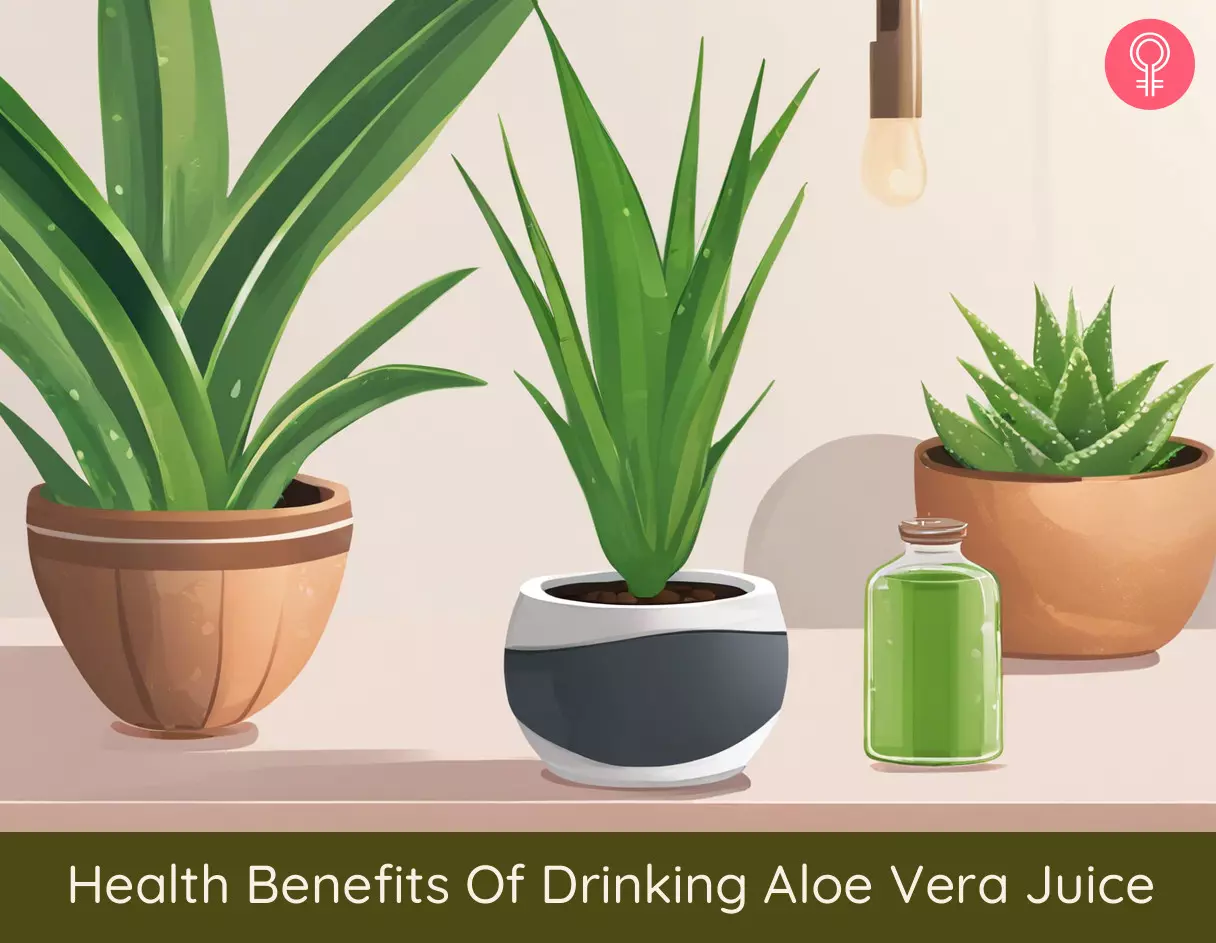
Image: Stable Diffusion/StyleCraze Design Team
References
Articles on StyleCraze are backed by verified information from peer-reviewed and academic research papers, reputed organizations, research institutions, and medical associations to ensure accuracy and relevance. Read our editorial policy to learn more.
- Surjushe, Amar et al. “Aloe vera: a short review.” Indian journal of dermatology vol. 53,4 (2008): 163-6.
https://www.ncbi.nlm.nih.gov/pmc/articles/PMC2763764/ - Nagpal, Ravinder et al. “Effect of Aloe vera juice on growth and activities of Lactobacilli in-vitro.” Acta bio-medica : Atenei Parmensis vol. 83,3 (2012): 183-8.
https://pubmed.ncbi.nlm.nih.gov/23762993/ - Avijgan, Majid et al. “Effectiveness of Aloe Vera Gel in Chronic Ulcers in Comparison with Conventional Treatments.” Iranian journal of medical sciences vol. 41,3 Suppl (2016): S30.
https://pubmed.ncbi.nlm.nih.gov/27840496/ - Hong, Seung Wook et al. “Aloe vera Is Effective and Safe in Short-term Treatment of Irritable Bowel Syndrome: A Systematic Review and Meta-analysis.” Journal of neurogastroenterology and motility vol. 24,4 (2018): 528-535.
https://www.ncbi.nlm.nih.gov/pmc/articles/PMC6175553/ - Hamman, Josias H. “Composition and applications of Aloe vera leaf gel.” Molecules (Basel, Switzerland) vol. 13,8 1599-616. 8 Aug. 2008.
https://www.ncbi.nlm.nih.gov/pmc/articles/PMC6245421/ - Khedmat, Hossein et al. “Aloe vera in treatment of refractory irritable bowel syndrome: Trial on Iranian patients.” Journal of research in medical sciences : the official journal of Isfahan University of Medical Sciences vol. 18,8 (2013): 732.
https://www.ncbi.nlm.nih.gov/pmc/articles/PMC3872617/ - Radha, Maharjan H, and Nampoothiri P Laxmipriya. “Evaluation of biological properties and clinical effectiveness of Aloe vera: A systematic review.” Journal of traditional and complementary medicine vol. 5,1 21-6. 23 Dec. 2014.
https://www.ncbi.nlm.nih.gov/pmc/articles/PMC4488101/ - Nair, Gopakumar Ramachandran et al. “Clinical Effectiveness of Aloe Vera in the Management of Oral Mucosal Diseases- A Systematic Review.” Journal of clinical and diagnostic research : JCDR vol. 10,8 (2016): ZE01-7.
https://www.ncbi.nlm.nih.gov/pmc/articles/PMC5028429/ - Wan, Ping et al. “Advances in treatment of ulcerative colitis with herbs: from bench to bedside.” World journal of gastroenterology vol. 20,39 (2014): 14099-104.
https://www.ncbi.nlm.nih.gov/pmc/articles/PMC4202341/ - Langmead L, Makins RJ, Rampton DS. Anti-inflammatory effects of aloe vera gel in human colorectal mucosa in vitro. Aliment Pharmacol Ther. 2004;19(5):521–527.
https://www.ncbi.nlm.nih.gov/pubmed/14987320 - Vázquez B, Avila G, Segura D, Escalante B. Antiinflammatory activity of extracts from Aloe vera gel. J Ethnopharmacol. 1996;55(1):69–75.
url - Davis RH, Rosenthal KY, Cesario LR, Rouw GA. Processed Aloe vera administered topically inhibits inflammation. J Am Podiatr Med Assoc. 1989;79(8):395–397.
https://www.ncbi.nlm.nih.gov/pubmed/2810076 - Reuter J, Jocher A, Stump J, Grossjohann B, Franke G, Schempp CM. Investigation of the anti-inflammatory potential of Aloe vera gel (97.5%) in the ultraviolet erythema test. Skin Pharmacol Physiol. 2008;21(2):106–110.
https://www.ncbi.nlm.nih.gov/pubmed/18253066 - Davis RH, Maro NP. Aloe vera and gibberellin. Anti-inflammatory activity in diabetes. J Am Podiatr Med Assoc. 1989;79(1):24–26.
https://www.ncbi.nlm.nih.gov/pubmed/2724102 - Cowan D. Oral Aloe vera as a treatment for osteoarthritis: a summary. Br J Community Nurs. 2010;15(6):280–282.
https://www.ncbi.nlm.nih.gov/pubmed/20679979 - Vandana, K R et al. “In-vitro assessment and pharmacodynamics of nimesulide incorporated Aloe vera transemulgel.” Current drug discovery technologies vol. 11,2 (2014): 162-7.
https://pubmed.ncbi.nlm.nih.gov/24295369/ - Dana, Nasim et al. “The effect of Aloe vera leaf gel on fatty streak formation in hypercholesterolemic rabbits.” Journal of research in medical sciences : the official journal of Isfahan University of Medical Sciences vol. 17,5 (2012): 439-42.
https://www.ncbi.nlm.nih.gov/pmc/articles/PMC3634268/ - Kaithwas G, Dubey K, Pillai KK. Effect of aloe vera (Aloe barbadensis Miller) gel on doxorubicin-induced myocardial oxidative stress and calcium overload in albino rats. Indian J Exp Biol. 2011;49(4):260–268.
https://www.ncbi.nlm.nih.gov/pubmed/21614889 - Jain N, Vijayaraghavan R, Pant SC, Lomash V, Ali M. Aloe vera gel alleviates cardiotoxicity in streptozocin-induced diabetes in rats. J Pharm Pharmacol. 2010;62(1):115–123.
https://www.ncbi.nlm.nih.gov/pubmed/20723007 - Choudhary, Monika et al. “Hypoglycemic and hypolipidemic effect of Aloe vera L. in non-insulin dependent diabetics.” Journal of food science and technology vol. 51,1 (2014): 90-6. doi:10.1007/s13197-011-0459-0
https://www.ncbi.nlm.nih.gov/pmc/articles/PMC3857397/ - Lim BO, Seong NS, Choue RW, et al. Efficacy of dietary aloe vera supplementation on hepatic cholesterol and oxidative status in aged rats. J Nutr Sci Vitaminol (Tokyo). 2003;49(4):292–296.
https://www.ncbi.nlm.nih.gov/pubmed/14598919 - Cellini L, Di Bartolomeo S, Di Campli E, Genovese S, Locatelli M, Di Giulio M. In vitro activity of Aloe vera inner gel against Helicobacter pylori strains. Lett Appl Microbiol. 2014;59(1):43–48.
https://www.ncbi.nlm.nih.gov/pubmed/24597562 - Salehi, Bahare et al. “Aloe Genus Plants: From Farm to Food Applications and Phytopharmacotherapy.” International journal of molecular sciences vol. 19,9 2843. 19 Sep. 2018, doi:10.3390/ijms19092843
https://www.ncbi.nlm.nih.gov/pmc/articles/PMC6163315/ - Rahmani, Arshad H et al. “Aloe vera: Potential candidate in health management via modulation of biological activities.” Pharmacognosy reviews vol. 9,18 (2015): 120-6.
https://www.ncbi.nlm.nih.gov/pmc/articles/PMC4557234/ - Guan, Yong-Song, and Qing He. “Plants Consumption and Liver Health.” Evidence-based complementary and alternative medicine : eCAM vol. 2015 (2015): 824185.
https://www.ncbi.nlm.nih.gov/pmc/articles/PMC4499388/ - Can A, Akev N, Ozsoy N, et al. Effect of Aloe vera leaf gel and pulp extracts on the liver in type-II diabetic rat models. Biol Pharm Bull. 2004;27(5):694–698.
https://www.ncbi.nlm.nih.gov/pubmed/15133247 - Monteiro, Rosário, and Isabel Azevedo. “Chronic inflammation in obesity and the metabolic syndrome.” Mediators of inflammation vol. 2010 (2010): 289645.
https://www.ncbi.nlm.nih.gov/pmc/articles/PMC2913796/ - Tanaka, Miyuki & Misawa, Eriko & Yamauchi, Koji & Abe, Fumiaki & Ishizaki, Chiaki. (2015). Effects of plant sterols derived from Aloe vera gel on human dermal fibroblasts in vitro and on skin condition in Japanese women. Clinical, cosmetic and investigational dermatology. 8. 95-104.
https://www.researchgate.net/publication/273469470_Effects_of_plant_sterols_derived_from_Aloe_vera_gel_on_human_dermal_fibroblasts_in_vitro_and_on_skin_condition_in_Japanese_women - Misawa, Eriko & Tanaka, Miyuki & Nomaguchi, Kouji & Yamada, Muneo & Toida, Tomohiro & Takase, Mitsunori & Iwatsuki, Keiji & Kawada, Teruo. (2008). Administration of phytosterols isolated from Aloe vera gel reduce visceral fat mass and improve hyperglycemia in Zucker diabetic fatty (ZDF) rats. Obesity Research & Clinical Practice – OBES RES CLIN PRACT. 2. 239-245.
https://www.researchgate.net/publication/246155370_Administration_of_phytosterols_isolated_from_Aloe_vera_gel_reduce_visceral_fat_mass_and_improve_hyperglycemia_in_Zucker_diabetic_fatty_ZDF_rats/citation/download - Misawa E, Tanaka M, Nabeshima K, et al. Administration of dried Aloe vera gel powder reduced body fat mass in diet-induced obesity (DIO) rats. J Nutr Sci Vitaminol (Tokyo). 2012;58(3):195–201.
https://www.ncbi.nlm.nih.gov/pubmed/22878390 - Choi HC, Kim SJ, Son KY, Oh BJ, Cho BL. Metabolic effects of aloe vera gel complex in obese prediabetes and early non-treated diabetic patients: randomized controlled trial. Nutrition. 2013;29(9):1110–1114.
https://www.ncbi.nlm.nih.gov/pubmed/23735317 - Bałan, Barbara Joanna et al. “Oral administration of Aloe vera gel, anti-microbial and anti-inflammatory herbal remedy, stimulates cell-mediated immunity and antibody production in a mouse model.” Central-European journal of immunology vol. 39,2 (2014): 125-30.
https://www.ncbi.nlm.nih.gov/pmc/articles/PMC4440021/ - Zhang, Yiyi et al. “Efficacy of Aloe Vera Supplementation on Prediabetes and Early Non-Treated Diabetic Patients: A Systematic Review and Meta-Analysis of Randomized Controlled Trials.” Nutrients vol. 8,7 388. 23 Jun. 2016.Library of Medicine, National Institutes of Health.
https://www.ncbi.nlm.nih.gov/pmc/articles/PMC4963864/ - Yimam, Mesfin et al. “Blood glucose lowering activity of aloe based composition, UP780, in alloxan induced insulin dependent mouse diabetes model.” Diabetology & metabolic syndrome vol. 6 61. 24 May. 2014.
https://www.ncbi.nlm.nih.gov/pmc/articles/PMC4041641/ - Hussain A, Sharma C, Khan S, Shah K, Haque S. Aloe vera inhibits proliferation of human breast and cervical cancer cells and acts synergistically with cisplatin. Asian Pac J Cancer Prev. 2015;16(7):2939–2946.
https://www.ncbi.nlm.nih.gov/pubmed/25854386 - Upadhyay, Ravi. (2018). Nutraceutical, therapeutic, and pharmaceutical potential of Aloe vera: A review. International Journal of Green Pharmacy. 12.
https://www.researchgate.net/publication/325256526_Nutraceutical_therapeutic_and_pharmaceutical_potential_of_Aloe_vera_A_review - Sierra-García GD, Castro-Ríos R, González-Horta A, Lara-Arias J, Chávez-Montes A. Acemannan, an extracted polysaccharide from Aloe vera: A literature review. Nat Prod Commun. 2014;9(8):1217–1221.
https://www.ncbi.nlm.nih.gov/pubmed/25233608 - Lissoni P, Rovelli F, Brivio F, et al. A randomized study of chemotherapy versus biochemotherapy with chemotherapy plus Aloe arborescens in patients with metastatic cancer. In Vivo. 2009;23(1):171–175.
https://www.ncbi.nlm.nih.gov/pubmed/19368145 - Dal’Belo SE, Gaspar LR, Maia Campos PM. Moisturizing effect of cosmetic formulations containing Aloe vera extract in different concentrations assessed by skin bioengineering techniques. Skin Res Technol. 2006;12(4):241–246.
https://www.ncbi.nlm.nih.gov/pubmed/17026654 - Sujatha, G et al. “Aloe vera in dentistry.” Journal of clinical and diagnostic research : JCDR vol. 8,10 (2014): ZI01-2.
https://www.ncbi.nlm.nih.gov/pmc/articles/PMC4253296/ - Karim B, Bhaskar DJ, Agali C, et al. Effect of Aloe vera mouthwash on periodontal health: triple blind randomized control trial. Oral Health Dent Manag. 2014;13(1):14–19.
https://www.ncbi.nlm.nih.gov/pubmed/24603910 - Ajmera, Neha et al. “Aloe vera: It’s effect on gingivitis.” Journal of Indian Society of Periodontology vol. 17,4 (2013): 435-8.
https://www.ncbi.nlm.nih.gov/pmc/articles/PMC3800403/ - Hashemi, Seyyed Abbas et al. “The Review on Properties of Aloe Vera in Healing of Cutaneous Wounds.” BioMed research international vol. 2015 (2015): 714216.
https://www.ncbi.nlm.nih.gov/pmc/articles/PMC4452276/ - Gupta, Neha et al. “Aloe-Vera: A Nature’s Gift to Children.” International journal of clinical pediatric dentistry vol. 3,2 (2010): 87-92.
https://www.ncbi.nlm.nih.gov/pmc/articles/PMC4968173/ - Nelson, Erika D et al. “Neurologic effects of exogenous saccharides: a review of controlled human, animal, and in vitro studies.” Nutritional neuroscience vol. 15,4 (2012): 149-62.
https://www.ncbi.nlm.nih.gov/pmc/articles/PMC3389826/ - Kines, Kasia, and Tina Krupczak. “Nutritional Interventions for Gastroesophageal Reflux, Irritable Bowel Syndrome, and Hypochlorhydria: A Case Report.” Integrative medicine (Encinitas, Calif.) vol. 15,4 (2016): 49-53.
https://www.ncbi.nlm.nih.gov/pmc/articles/PMC4991651/ - Panahi, Yunes et al. “Efficacy and safety of Aloe vera syrup for the treatment of gastroesophageal reflux disease: a pilot randomized positive-controlled trial.” Journal of traditional Chinese medicine = Chung i tsa chih ying wen pan vol. 35,6 (2015): 632-6.
https://pubmed.ncbi.nlm.nih.gov/26742306/ - Sampath Kumar, Debjit Bhowmik, Chiranjib, and Biswajib. “Aloe Vera: A Potential Herb And Its Medicinal Importance.” Journal of Chemical And Pharmaceutical Research.
https://www.jocpr.com/articles/aloe-vera–a-potential-herb-and-its-medicinal-importance.pdf - Guo, Xiaoqing, and Nan Mei. “Aloe vera: A review of toxicity and adverse clinical effects.” Journal of environmental science and health. Part C, Environmental carcinogenesis & ecotoxicology reviews vol. 34,2 (2016): 77-96.
https://www.ncbi.nlm.nih.gov/pmc/articles/PMC6349368/ - Foster, Meika. “Evaluation of the Nutritional and Metabolic Effects of Aloe Vera.” Herbal Medicine: Biomolecular and Clinical Aspects. 2nd Edition., U.S. National Library of Medicine, 1 Jan. 1970.
www.ncbi.nlm.nih.gov/books/NBK92765/ - Saka, Wa et al. “Changes in Serum Electrolytes, Urea, and Creatinine in Aloe Vera-treated Rats.” Journal of young pharmacists : JYP vol. 4,2 (2012): 78-81.
https://www.ncbi.nlm.nih.gov/pmc/articles/PMC3385221/ - Yang, Ha Na et al. “Aloe-induced toxic hepatitis.” Journal of Korean medical science vol. 25,3 (2010): 492-5.
https://www.ncbi.nlm.nih.gov/pmc/articles/PMC2826749/ - Lee, Anna, et al. “Possible interaction between sevoflurane and Aloe vera.” Annals of Pharmacotherapy 38.10 (2004): 1651-1654.
https://pubmed.ncbi.nlm.nih.gov/15292490/ - Paoletti, Angelica, et al. “Interactions between natural health products and oral anticoagulants: spontaneous reports in the Italian Surveillance System of Natural Health Products.” Evidence-based complementary and alternative medicine 2011 (2011).
https://www.ncbi.nlm.nih.gov/pmc/articles/PMC3025393/ - Alinejad-Mofrad, Samaneh, et al. “Improvement of glucose and lipid profile status with Aloe vera in pre-diabetic subjects: a randomized controlled-trial.” Journal of Diabetes & Metabolic Disorders 14.1 (2015): 22.
https://www.ncbi.nlm.nih.gov/pmc/articles/PMC4399423/
Read full bio of Ariana Fiorita
- Ronald Smith, RDN, has around 8 years of experience in weight loss and diet coaching to enhance people’s overall health and well-being. He also enjoys writing about and reviewing the latest health products and supplements.
 Ronald Smith, RDN, has around 8 years of experience in weight loss and diet coaching to enhance people’s overall health and well-being. He also enjoys writing about and reviewing the latest health products and supplements.
Ronald Smith, RDN, has around 8 years of experience in weight loss and diet coaching to enhance people’s overall health and well-being. He also enjoys writing about and reviewing the latest health products and supplements. - Dr. Jesse P. Houghton, MD, FACG, is a gastroenterologist with over two decades of experience in internal medicine and gastroenterology. He has been practicing at Southern Ohio Medical Center as the Senior Medical Director of Gastroenterology since 2012. He is also an Adjunct Clinical Associate Professor of Medicine at the Ohio University School of Osteopathic Medicine.
 Dr. Jesse P. Houghton, MD, FACG, is a gastroenterologist with over two decades of experience in internal medicine and gastroenterology. He has been practicing at Southern Ohio Medical Center as the Senior Medical Director of Gastroenterology since 2012. He is also an Adjunct Clinical Associate Professor of Medicine at the Ohio University School of Osteopathic Medicine.
Dr. Jesse P. Houghton, MD, FACG, is a gastroenterologist with over two decades of experience in internal medicine and gastroenterology. He has been practicing at Southern Ohio Medical Center as the Senior Medical Director of Gastroenterology since 2012. He is also an Adjunct Clinical Associate Professor of Medicine at the Ohio University School of Osteopathic Medicine.
Read full bio of Arshiya Syeda
Read full bio of Sindhu Koganti









